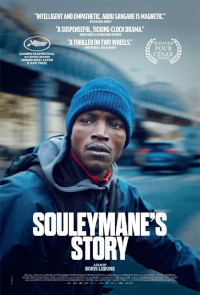| SHADOWS ON THE WALL | REVIEWS | NEWS | FESTIVAL | AWARDS | Q&A | ABOUT | TALKBACK | |||||||||||||||||||||||||||||
 Shadows off the beaten path Shadows off the beaten pathIndies, foreign, docs and shorts...
On this page:
SOULEYMANE'S STORY |
THE VILE |
THE VOICE OF HIND RAJAB
| |||||||||||||||||||||||||||||
| See also: SHADOWS FILM FESTIVAL | Last update 19.Oct.25 | |||||||||||||||||||||||||||||
|
Souleymane’s Story L’Histoire de Souleymane Review by Rich Cline | 
CANNES FILM FEST TORONTO FILM FEST Is it streaming?
| 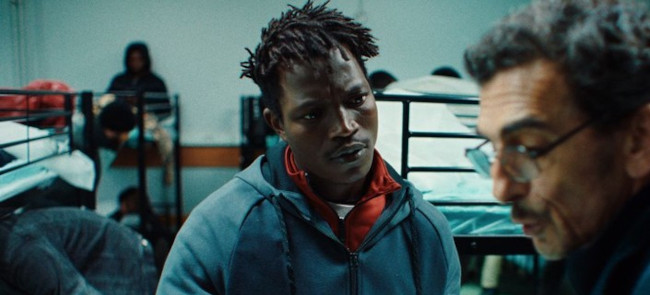 Packed with anecdotes that are clearly based on true stories, this drama explores the immigrant experience from a West African perspective. Filmmaker Boris Lojkine takes a documentary-style approach, echoing Ken Loach's earthy realism as a young man in Paris faces increasing obstacles as he strains to make his life less precarious. This involving and often harrowing film isn't always easy to watch, but it's provocative and vitally important. Working as bicycle deliveryman, Guinean asylum-seeker Souleymane (Sangare) is tryign to get legal residency in France. And he needs to explain his political past in an interview in two days. He's advised to tell the truth consistently, so officials know he isn't lying. But he's rehearsing details to make his case more convincing. In all of this, he's at the mercy of his boss, customers, a fixer (Sow) and friends who want to help. But he's not very patient, and he's always running late. And he needs to keep his cool with the interviewer (Meurisse). The camera follows Souleymane closely as he cycles through streets, interacting with a wide variety of people from all over the world. This includes good-natured teasing from fellow African immigrants, and the lively scene in the refugee shelter. It seems like Souleymane spends every moment of every day in survival mode, trying to contact people who are don't want to pay him what he has earned or give him any kind of break. In the centre of almost every frame, Sangare holds the attention with strong charisma and a warmly engaging personality, allowing us to feel Souleymane's yearning for something to go his way. His detailed performance makes this portrait unusually vivid, from the perils of riding a bicycle in Parisian traffic to needing to wake up in the night to book his bed for tomorrow. Even the slightest baseless complaint can jeopardise his job. And he worries about his mother back home, trying to make sure someone is taking care of her. Whether the story Souleymane tells is fact or fiction is beside the point, because what he has been through is profoundly inhumane. His odyssey over these two days is fairly nonstop, going from one intense situation to another. And he knows he is powerless to do any of it on his own.. This is vital filmmaking that bristles with honesty. It's also a remarkably astute depiction of a young man doing everything to find a path to a promising future against all odds.
|
| The Vile Review by Rich Cline | 
| 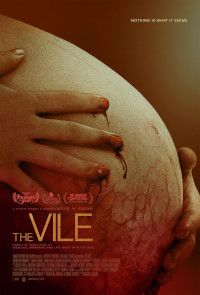 dir Majid Al Ansari scr Majid Al Ansari, Johnnie Alward prd Rami Yasin, Roy Lee, Steven Schneider, Derek Dauchy with Bdoor Mohammad, Sarah Taibah, Eman Tarik, Jasem AlKharraz, Nora Ali, Saeed AlHarsh, Samira Al Wahaibi, Ranim Elaasar, Khawlah Abdu Salam, Maryam, Abrar Al Khafaji, Salem Al Mesmari release US Sep.25 ff, UK Oct.25 lff, UAE 30.Oct.25 25/UAE 1h41  Is it streaming?
| 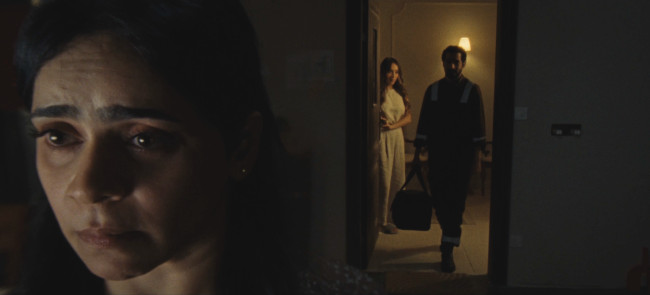 Opening with a classical old-school scary movie sequence in which things go bump in the dark, this Emirati horror playfully indulges in visual jolts, red herrings and some full-on nastiness. It's also an insidious psychological thriller about a stranger in the house. With stunningly dark-hued 16mm cinematography, director-cowriter Majid Al Ansari inventively evokes an unnerving atmosphere, deploying cinematic flourishes involving sound and light without the usual cheap tricks. Amani (Mohammad) is shocked when her husband Khaled (Alkharraz) turns up with pregnant second wife Zahra (Taibah). Heartbroken and worried for her teen daughter Noor (Tarik), Amani turns to her sister Salma (Ali) for help. But Khaled wants to be one big happy family, as Zahra can give him a son. As Amani tries to affirm her role as the family matriarch, she becomes convinced that Zahra is both trying to drive her crazy and steal Noor from her. So she begins digging into Zahra's past, tracking down Zahra's first husband's wife Huda (Al Wahaibi). Telling details establish Amani and Noor's tight relationship before their world comes unglued. Now Amani sobs while watching her wedding video. She also recoils at Zahra's lipstick on a coffee mug, drawing blood when it breaks. Meanwhile, Noor is cruelly teased by mean girls at school, feeding into the way her loyalties are tested at home. And with strange goings-on in the house at night, everyone is on edge. Some of the mayhem is over-egged, but it's grounded in resonant underlying ideas. Earthy honesty gives life to the characters, even in soapier moments. Mohammad and Tarik play Amani and Noor as observant women reacting in different ways to this new reality. So Taibah's smiling Zahra provokes confusing emotions, making Amani panic as Noor is seduced. Zahra seems both ambitious and overly helpful, which of course makes her seem even more sinister. By contrast, Alkharraz's Khaled is stony and rather pathetic in his unthinking selfishness. Most of this is viewed through Amani's observant, worried eyes, and she remains hugely sympathetic as she faces her fears. The knowing point is that women pay the price for the mistakes men make, and this can be especially painful in male-dominated cultures. So when a woman becomes the menace, it feels like the world has turned upside down. These ideas add fuel to the freak-out scenes, sending the narrative in unexpected directions. The film's final act is a surreally mind-bending trip into the fears these women need to conquer.
|
| The Voice of Hind Rajab Review by Rich Cline | 
| 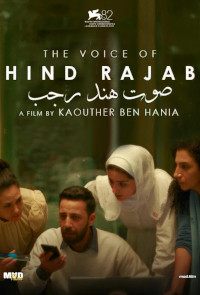 dir-scr Kaouther Ben Hania prd Nadim Cheikhrouha, Odessa Rae, James Wilson with Motaz Malhees, Saja Kilani, Amer Hlehel, Clara Khoury, Nesbat Serhan, Ramy Brahem, Firas Khoury, Ali Talel Yacoub, Heba Bader, Oday Ayoyda release US Oct.25 ciff, UK 16.Jan.26 25/Tunisia 1h29 VENICE FILM FEST TORONTO FILM FEST  Now streaming...
| 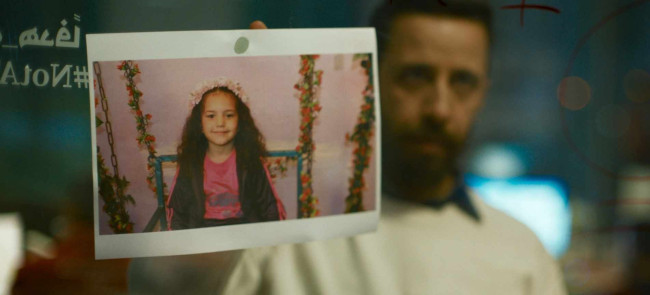 Based on real emergency phone calls, this documentary-infused drama traces a harrowing series of events. Chillingly, filmmaker Kaouther Ben Hania uses recordings of the actual voices down the line mixed with dramatised recreations of aid workers who are essentially helpless in an emergency. It's a hauntingly current film that walks a very fine tightrope between exploiting victims of a tragedy and calling attention to a complex, horrific situation. In January 2024, the Israeli army attacks a Gaza neighbourhood. At a call centre 52 miles away, Red Crescent worker Omar (Malhees) receives a terrified request for help from a woman, followed by the sound of gunfire. But 6-year-old Hind is still alive, hidden in a car with the bodies of her aunt, uncle and cousins. Omar and his colleague Rana (Kilani) continue speaking to Hind as soldiers keep shooting at her. And they become increasingly worried because it takes hours for their overworked coworker Madhi (Hlehel) to send an ambulance to rescue Hind. Using real voices adds a macabre sensibility that sits at odds with the warmly involved, brightly lit call centre drama. This includes some overtly pushy moments, along with soap-style details and over-reactions. Both Malhees and Kilani give openly emotive performances. All Omar and Rana can do is kindly speak to Hind, to keep her company in a terrifying situation. It's hardly surprising that they continually lose their cool. And the urgency is so intense that we can barely breathe while watching this. Omar is furious that the rescue involves protracted discussions between various factions in order to guarantee that workers can get through without being shot themselves. An ambulance is only eight minutes away from Hind, but Hlehel's tenacious, exhausted Mahdi knows that negotiating a safe route requires working with a wide range of authorities. Additional issues include the fact that the army is jamming phone signals in Gaza, which hinders aid workers from getting to those in desperate need. This is a powerfully important story that offers insight into an ongoing nightmare scenario, but the way it uses real people makes us feel uncomfortable. Hearing the voice and seeing photos of this frightened little girl is truly unnerving, even as it helps us feel what's going through the minds of the people who were on the line with her over three impossibly intense hours. Combined with later documentary footage, this vividly reveals the harsh complexities of wartime, especially conflict that's this ruthless and inhumane.
| 
See also: SHADOWS FILM FESTIVAL © 2025 by Rich Cline, Shadows
on the Wall
HOME | REVIEWS | NEWS | FESTIVAL | AWARDS
| Q&A | ABOUT | TALKBACK | | ||||||||||||||||||
